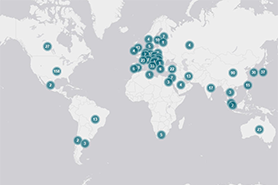This is the website of the new Open Edition of the CWTS Leiden Ranking.
The traditional Leiden Ranking can be found here.
CWTS Leiden Ranking Open Edition
Based on open data from OpenAlex, the CWTS Leiden Ranking Open Edition offers fully transparent information about the scientific performance of over 1500 major universities worldwide. Select your preferred indicators, generate results, and explore the performance of universities.

List view
Select an indicator, generate a ranking and explore the performance of universities
Leiden Ranking 2024 - List
Chart view
Select two indicators, generate a scatter plot and explore the performance of universities
Leiden Ranking 2024 - Chart
Map view
Select an indicator, generate a geographical map and explore the performance of universities
Leiden Ranking 2024 - MapSelect, generate and explore
The Leiden Ranking enables you to select sophisticated bibliometric indicators, to generate results based on these indicators and to explore the results from three different perspectives. Best known is the traditional list view, in which you can rank universities according to a selected indicator. The Leiden Ranking offers two additional perspectives: the chart view and the map view. The chart view shows universities in a scatter plot, so that you can explore the performance of universities using two selected indicators. The map view shows universities in a world map and provides a geographical perspective on universities and their performance.
Multidimensional perspective
The Leiden Ranking stands for a multidimensional perspective on university performance. Our principles for responsible use of university rankings explain why this is crucial. It is up to you to select the indicator that you wish to use to rank universities. The Leiden Ranking provides indicators of scientific impact, collaboration, and open access publishing. Size matters when comparing universities: performance can be viewed from an absolute or a relative perspective (e.g., the number versus the percentage of highly cited publications). That is why size-dependent and size-independent indicators are consistently presented together in the Leiden Ranking. This highlights that both types of indicators need to be taken into account.
A unique ranking
Compared with other university rankings, the Leiden Ranking offers more advanced bibliometric indicators. The underlying methodology is richly documented. The Leiden Ranking provides information exclusively about the research done at universities. Research is represented in publications, and carefully collected data about these publications forms the basis for the Leiden Ranking. This basis also ensures the independence of the Leiden Ranking, since there is no reliance on data submitted by the universities themselves. Finally, because universities are complex institutions that have a variety of forms, contexts and missions, their performance cannot be represented by a single number. The Leiden Ranking presents a variety of indicators for you to explore the performance of universities from different angles.
Leiden Ranking Open Edition 2024
October 9, 2024. Release of the Leiden Ranking Open Edition 2024. This new release of the Leiden Ranking Open Edition is based on the most up-to-date data from the OpenAlex database. In addition, the web interface now offers an easy way to contextualize the ranking statistics by exploring the underlying publications. More information is available in this blog post.
Leo Waaijers Open Science Award 2024
September 20, 2024. We are proud to share that the CWTS Leiden Ranking Open Edition has been nominated and shortlisted for the Leo Waaijers Open Science Award 2024.
Created in partnership with:










